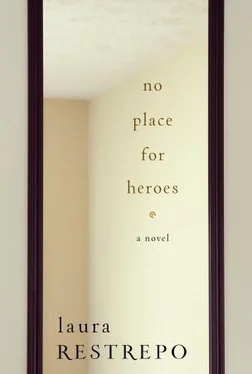
WHY HADN’T RAMÓN ever looked for Mateo? The question kept Lorenza awake that night. In her insomnia, near dawn, she wanted to put these thoughts to rest and started reading the novel by Bernhard Schlink that she had bought a few days earlier on Avenida Corrientes. And by chance she came upon a passage that perhaps held the only answer to that impossible question. Why hadn’t Ramon looked for Mateo all those years? “There are some things you do just because,” Schlink wrote, “because the conscience dozes, becomes anesthetized, not because we make this or that decision, but because what we decide is precisely not to decide, as if our will is overwhelmed by the impossibility of finding a way out and decides to stop pedaling and idles while it can.” Perhaps the reason Ramón did not look for Mateo was simply because he did not look for him. Perhaps there was no other answer but that, leaving a void where the boy so much wanted answers.
Lorenza read Schlink’s passage several times, thinking that she would have to read it to Mateo. Or maybe not, it would be too difficult for him. She had always tried to protect her son from the pain of the past, as if she could suppress it by simply not naming it. Silencing words had been her main tool, and perhaps it was for that, more than the acts themselves, that Mateo could not forgive her. He couldn’t forgive her for minimizing the past, making it seem unimportant, trying to neutralize it, avoiding the topic, not reacting to it. It was possible that Mateo felt that when she came between him and the raging bull of his abandonment, she prevented him from seeing it fully, and left him defenseless against its charge. It was possible that Mateo believed that by denying the loneliness of abandonment, instead of exorcising it, she helped to multiply it, leaving him even more alone. Or was it her own fault, her role in everything which she tried to camouflage with euphemisms?
At breakfast the following morning, all these questions had been reduced to the phantoms of her sleeplessness, truths intuited but not fully integrated. The insomniac night once again constrained her to futile gestures and truncated language, because how could she name such things without deepening the wound, where could she find rhyme or reason? There are never good enough reasons for a father’s abandonment, and that made it unnamable. Idling , the Schlink passage said, how well it applied to Lorenza.

LORENZA AND MATEO had a couple of bad days following that, dejected and keeping their distance from each other in reverse, the boy holed up in his dark mood and not coming out of his room, and Lorenza sleepless at night and struggling to work while dozing off during the day. On returning to the hotel, all she had to do was see the PLEASE DON’T DISTURB sign hanging on the door to guess that inside the beds would be unmade, towels would be strewn on the floor, the drapes drawn, and in the middle of the shipwreck her son, in his pajamas still, hair uncombed, subsisting on chocolates, potato chips, and Coca-Colas from the minibar, and in a catatonic state in front of his PlayStation, which would be spitting smoke from hour after hour of continual use. She had always been afraid of the PlayStation. It sounded ridiculous, the idea of fearing such an object, a toy. But that’s how it was. The way that Mateo allowed himself to be devoured by the thing made her anxious. It put her on edge — the repetitive little electronic music that invaded him and transported him to a distant world, hyperkinetic and overpopulated with kicking and punching cartoons, who fired machine guns, jumped over barrels, climbed towers, fell over dead, came back to life, crossed through labyrinths, drowned in a moat, and tossed grenades, always at an unsustainable ultrahuman rhythm that was in stark contrast with the statuesque stillness that was Mateo, because aside from his dancing pupils and his thumbs, which punched at buttons in sync with the frenzy on the screen, everything else about him was stillness, absence, hypnosis. And of course, the frightening thing wasn’t the game but what Mateo did not say, what he avoided, what he denied when he sat down in a lotus position, like a boy Buddha, in front of that strange illuminated altar. After Mateo learned about the circumstances surrounding his father’s prison sentence, he decided to close his ears and mouth and wanted to know nothing more about him, about Buenos Aires, but also nothing more about his mother.
He announced that he would return to Bogotá as soon as they could get a plane reservation, and she could find no arguments to dissuade him. There was no way she could get him to allow them more time to find a less disheartening finale to the trip that they had undertaken with such great hopes.
“Do you want to talk, Mateo?” Lorenza asked him, but her son was so absorbed in the game that he did not even respond.
“Son, don’t you think we should talk?” she insisted.
“No, Lolé, anything you say will make me feel like shit. I don’t like the way you talk to me.”
“I’m doing what I can, kiddo, telling you about things as they happened—”
“That’s the problem, you are Wonder Woman and the whole story is like a screenplay for an action film. Your Ramón is a comic-book hero. He does this thing here. Zap! Wap! Does that thing there. Boom! Shoom! He falls, he gets up. Krak! Crock! He’s arrested, released, fights against the villains, against the good guys. It doesn’t make sense, Lorenza, do you understand? That fiction has nothing to do with the Ramón who is my father. My father is a weirdo, a shitty crook, a frustrated one at that, who doesn’t have the balls to show his face, to come offer me some explanations. What does your wide-shouldered warrior have to do with that bastard who erases himself, who disappears? Riiiiiiiiing … Riiiiiiing … Hello? Who is it? No one, nobody, no response, I don’t know, wrong number, who gives a shit.”
“Couldn’t you wait for me a few days, Mateo, until I finish my duties here in Buenos Aires, and then we can return together to Bogotá?” she asked. “Or if you want, you can go tomorrow morning to Bariloche, and do some skiing until I come pick you up.”
But Mateo refused outright. The only thing he wanted was to be left alone and in peace, submerged in his PlayStation, lost to the world.

ON THE THIRD day of Mateo’s isolation, Lorenza decided to cancel all her appointments and stay in the hotel with him, playing with him on the PlayStation, to see if she could reestablish some sort of contact in this manner. If Muhammad can’t go to the mountain, the mountain is going to have to sit down at the PlayStation.
“Can I play with you?” she asked.
“No, you don’t know how.”
“You can teach me.”
“You’re too old, you don’t have the reflexes.”
“So try me.”
“All right, but let’s play Dynasty Warriors.”
“Whatever you want.”
“Lock the door and hang up the sign, so no one interrupts.”
“Who’s going to interrupt?”
“Just hang the sign, will you? Dynasty Warriors is my favorite of all the PlayStation games. You play in steps, and the more you advance, the more skilled Wei-Wulong becomes and the more powers he acquires,” he explained, suddenly very talkative. Speaking of Wei-Wulong filled him with pride, as if he himself were the one who possessed those powers. Lorenza hung the sign on the doorknob and they entered, Wu, Shu, and Wei, the three kingdoms of Dynasty Warriors, where everything was brutal and luminous. Here there was no resting, but also no fatigue; the battles were ferocious but devoid of blood and bodies, because when an enemy was eliminated, all it did was flash and disappear right away. Mateo barely blinked, everything about him was concentration, tension, and alert reflexes, his vision good only for the vertiginous slashes of the swords. Lorenza noticed how amid those brilliant, sparkling colors, the room vanished and the other world slowly shut off, a slow and boring thing. At this moment, Mateo does not exist, she thought. Wei-Wulong has taken possession of my son.
Читать дальше













